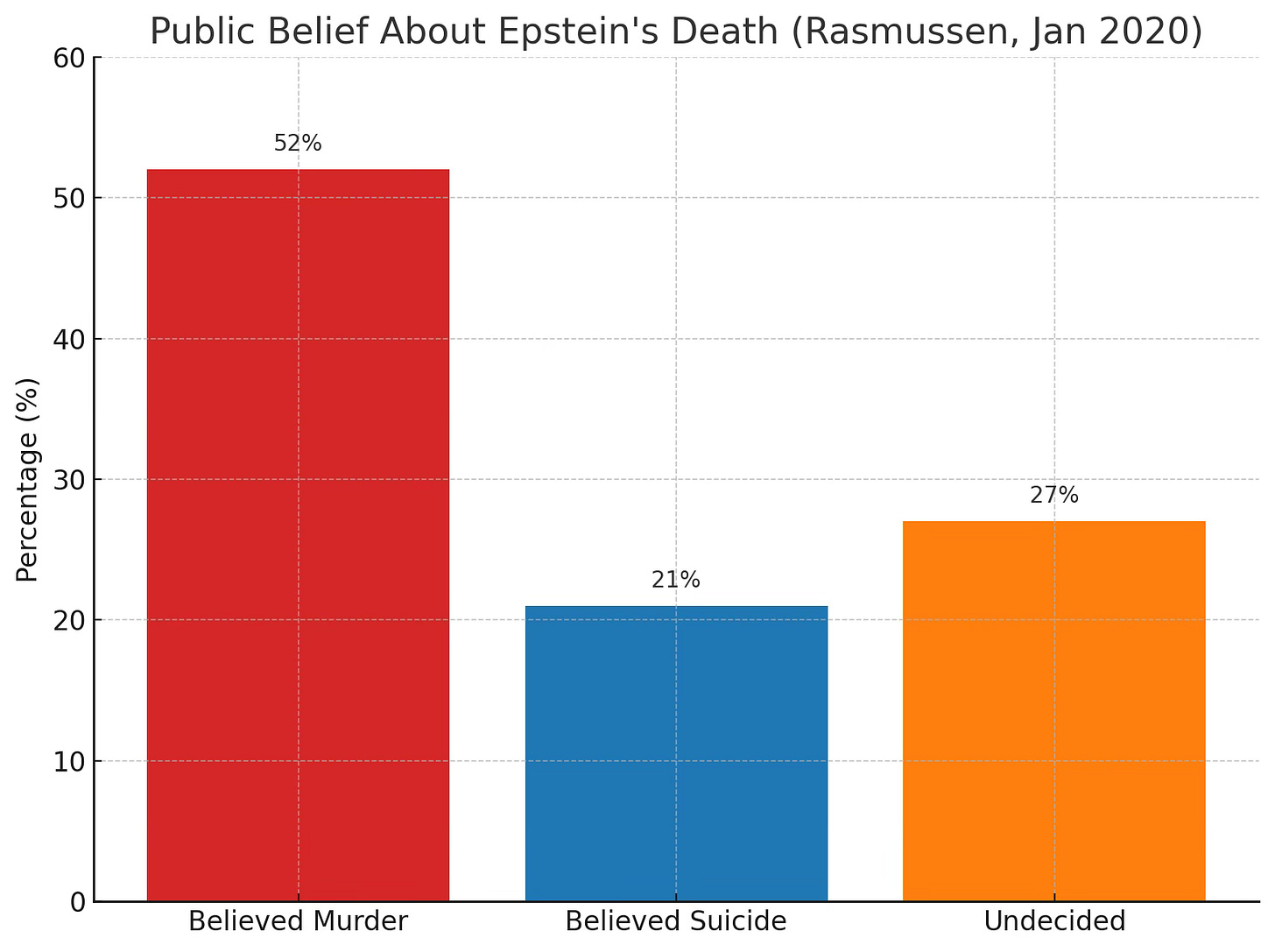There's no Epstein List? Really?
What you’ll read about in this post:
The Department of Justice says Jeffrey Epstein committed suicide and there is no ‘client list.’ What do we make of this pivot from Attorney General Pam Bondi and her band of DOJ clowns?
Am I becoming a conspiracy theorist? Not exactly, but there are enough red flags to make me a believer on this one.
Conspiracy theories usually aren’t true, but we continue to believe them. Why?
“… yet their [conspiracy theories] power lies precisely in this: they box up the absence of evidence as though it were itself the evidence. Faced with silence—no documents, no witnesses—the plot thickens, becomes more hidden, more a ‘proof’ of what it wants to demonstrate.”
— Umberto Eco
The DOJ has some explaining to do
In 2019, Jeffrey Epstein supposedly committed suicide in his jail cell while awaiting trail on a number of charges, including human trafficking of children. A number of bizarre circumstances occurred on the night of Epstein’s death, and this led to most Americans believing that someone or a group of someones conspired to kill Epstein.
Epstein, who accrued large amounts of wealth as a financier, was connected to a number of high profile individuals who visited him on his private island in the US Virgin Islands. The general theory claims that Epstein’s celebrity friends engaged in the illegal sexual abuse of women and girls on the island. These wealthy and connected individuals had Epstein killed to prevent him from informing federal officials about their crimes.
The untimely and suspicious death of Epstein only fueled conspiracy theories. The public wanted answers. When President Donald Trump campaigned for re-election in 2024, he hinted about releasing information the federal government held about Epstein and his ‘clients.’
In February, Attorney General Pam Bondi claimed she had the Epstein client list sitting on her desk, further stoking the media frenzy which clamored for the release of these names. Four months later, and Bondi now says no client list exists. To say that conservatives are disappointed would be an understatement. Plenty of Trump supporters want Bondi’s head on a pike — either for lying to the American people about the existence of a list or for hiding an actual list.
Even more astonishing is the fact that the DOJ officially backs the findings of the New York medical examiner who ruled that Epstein died by suicide. FBI Director Kash Patel and his deputy director, Dan Bongino made political hay out of claiming this was a conspiracy. Now, both have shifted gears and say they have seen all the relevant files and agree that it was a suicide.
Bondi, Patel, and Bongino — the Three Stooges of the DOJ — sold the American people on the tale that they would reveal the ‘truth’ about the Epstein client list. Now, they’re peddling a different story. Just like the lying and incompetence of others in this administration, including Secretary of Defense Pete Hegseth, there will be no forthcoming punishment. No firings, no resignations, and certainly no accountability.
It was beyond comical to watch White House Press Secretary Karoline Leavitt try to spin Bondi’s statement about having the list on her desk. Leavitt immediately pivoted and made the claim that the Trump administration was committed to truth and transparency, which seemed laughable before today. Even Fox News reporter Peter Doocy seemed incredulous at the explanation regarding Bondi’s actions. Leavitt said that Bondi’s reference to having the list on her desk, she meant the entirety of the information regarding Epstein’s case.
Again, this places the Trump administration with two equally damning narratives.
There is no client list, and Pam Bondi is a liar.
There is a client list somewhere, and Pam Bondi and her DOJ are complicit in keeping it a secret.
Which is it?
I’m not a conspiracy guy, but …
History is almost always boring. There is rarely an evil cabal plotting a world takeover, and usually, the evidence reveals plausible explanations. People often take great leaps in logic to arrive at conspiracy theories like the infamous ‘Pizzagate,’ where a man believed that Hillary Clinton ran an underground human trafficking ring out of a Washington, D.C. pizza place. He was so convinced of the rumor that he took a rifle to the restaurant, firing shots in the building before police talked him down. As it so happened, there was no secret human trafficking operation. I think most conspiracy theories resemble Pizzagate. But the Epstein saga? It’s different.
In the wake of Jeffrey Epstein’s death, details emerged regarding his incarceration that brought up important questions that still remain unanswered more than six years later.
Knowing the nature of the accusations against Epstein, why did authorities put him in a cell with another inmate only to remove that inmate the day before his death?
Guards were supposed to physically look in the cell and check on Epstein’s condition every 30 minutes. On the night of his death, they did not follow this protocol. Why?
Why were the two cameras outside of Epstein’s cell not functioning on the night of his death? Did guards not alert administrators about this convenient problem?
How do we explain the multiple broken bones in Epstein’s neck? This isn’t common for a suicide by hanging but it is more frequent in strangulation.
When we look at these peculiarities individually, each one might have a plausible explanation. Collectively, these warrant far more scrutiny. When we add the potential motive for killing Epstein, we can’t ignore the alarm bells.
Is it possible that Epstein took his own life? Certainly. Maybe Bondi pulled a Joe McCarthy and there really is no client list. But when I consider the preponderance of evidence, I don’t know how anyone could conclude he hanged himself.
Why do we believe conspiracy theories?
If history is often so boring, and the answers ordinary, then how do these conspiracy theories still have such a prominent place in our culture? Why do we persist in believing them? There are legitimate reasons.
First, sometimes conspiracy theories turn out to be true. The United States has perpetrated some heinous acts that eroded trust and confidence in our federal government. Here is a small sampling of why we are prone to believe conspiracy theories:
Project MK Ultra — a CIA program which experimented on unknowing American citizens as subjects on how to mentally and psychologically break a person.
the Tuskegee Experiment — a government public health project which studied the effects of untreated syphilis on black men.
Operation Northwoods — another CIA plan which aimed to launch ‘false flag’ operations on American targets to justify an invasion into Cuba in 1961.
COINTELPRO — the FBI program to infiltrate and discredit political groups, particularly civil rights activists.
the PRISM program — the NSA’s massive surveillance and data collection project.
The actions of prior administrations should not lead us to the knee-jerk reaction that subsequent leaders have also done awful things. But people can’t and shouldn’t ignore the truth about how our government operated in the past.
Americans also have to reckon with a past that includes paranoia. The Salem Witch Trials and the Red Scare created high tension about outsiders infiltrating and undermining our communities. Problems like these highlight our irrational nature as a group.
There’s a strange sentiment that we also derive from the conspiracy theory, where a secretive plot by evildoers somehow makes us feel better than terrible events occurring for no particular reason or the work of one bizarre person. Examine the conspiracies around President John F. Kennedy’s assassination. What is more terrifying — a complex plot and coverup to kill the most important man in the world, or one mediocre Marine deciding to kill the most important man in the world?
Our belief in the conspiracy theory also connects to the popular culture. How many movies and television shows that are driven by a conspiracy style plot? People don’t want to watch something mundane like “Lee Harvey Oswald acted alone” because it’s boring. The internet and social media make it far easier to promulgate these ideas, regardless of how accurate they might be. Websites like Reddit allow conspiracy theorists to live in an echo chamber that creates the endless feedback loop that leads to Pizzagate.



